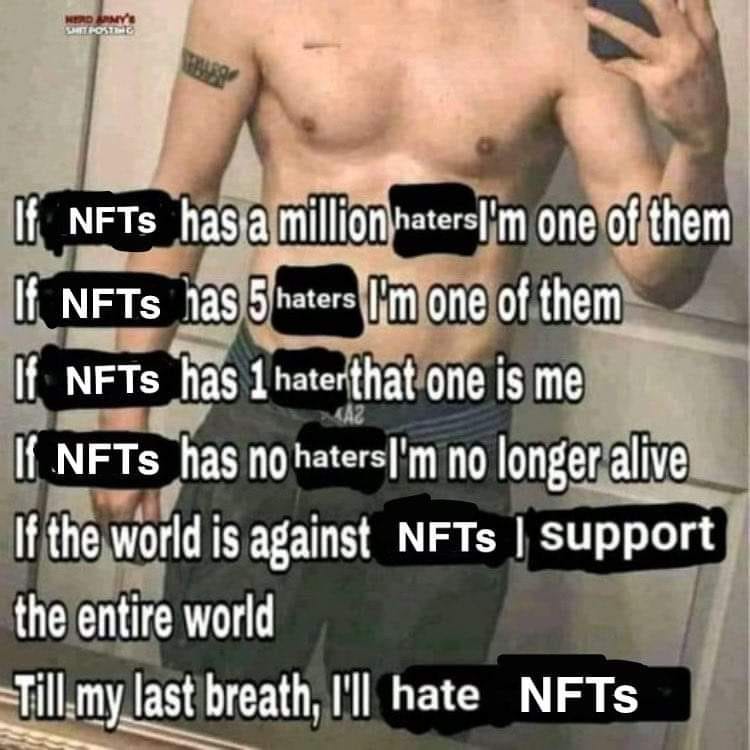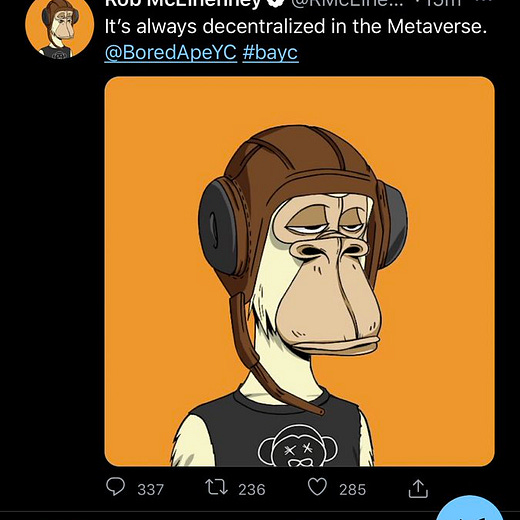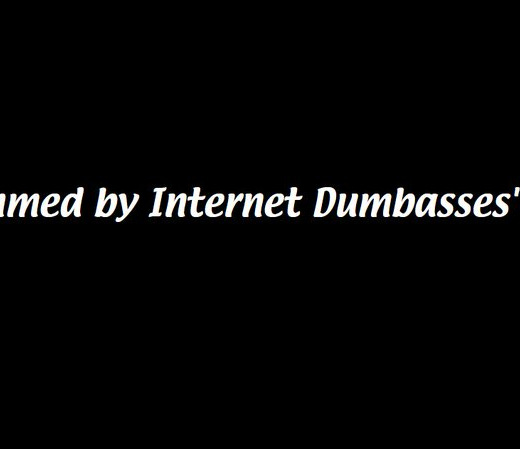The Week: virtual courtrooms, new culture wars and internet folk religions
Plus: a little sale for you, my cherished readers
Welcome to this week’s free edition of The Terminal.
As of today, I’ve stepped away from full-time work as editor of Business Insider Australia to focus on writing and freelancing. That means The Terminal is going to be a primary project with far more of my attention, and as I move into next year I aim to really build it out as a publication.
To kick things off, I’m running a little sale. If you subscribe for an annual plan now, your first year will be $50 instead of the usual price of $70. I’ll leave this offer open until December 31.
While we’re on housekeeping: I’ll be moving the weekly free post back to a Friday as of the next edition. (Thrilling, I know.)
Through the looking glass
Probably not much to be said about this which hasn’t already been said. But it really is funny that Meta is in full PR mode about its metaverse pivot, but still all it has to actually show us outside of carefully planned and scripted announcements is these jittery, legless Wii Sports avatars operated with clunky goggles and interfaces which even Nick Clegg himself seems to concede comes together with an overwhelming aura of crappiness.
I have no doubt whatsoever that this stuff improves and becomes more sophisticated as time goes on. But the wonderment of old-school futurism seems to have given way to a trillion-dollar company giving us a narrow glimpse into a plainly worse reality than what currently exists, and telling us it’s inevitable and that we’re going to love it.
The trial
A very funny Twitter thread there.
The story, in brief: a sovereign citizen type managed to successfully get a private prosecution against Victoria Premier Daniel Andrews listed at a regional magistrate’s court. Anyone can file a private criminal prosecution for a fee of $85.70, but they rarely get to the hearing stage. This one did, and the WebEx broadcast was quickly flooded with conspiracy types and reactionaries who had very little interest in the legal form of the proceedings but were quite interested in witnessing the collapse of the Victorian government. (The case was thrown out, unremarkably.)
There’s a great bit in BuzzFeed this week about how Facebook opposition to wind power — in all its weird manifestations — transmutes into real applications of local politics. Australians will already be well familiar with ‘wind turbine syndrome' and it’s strange influence on political outcomes. As I was reading it, I immediately thought about that influx of Facebook weirdos into the Dan Andrews hearing.
The most reflexive response to this is that Facebook Brain has become a rigid part of politics, and that it will only become more so as people spend more and more time online. Things happen online, and the increasingly frictionless relationship between reality and online spaces means their effects reverberate into The Real with greater ease. There was an actual protest outside the Magistrates court, but the Covid-related forcing of court business online meant far more people were able to enter the virtual courtroom. Ryan Broderick, in his newsletter Garbage Day, describes this as physical spaces “feeling the tangible effects of viral traffic”.
I think there’s obviously a lot of truth to that, and there’s no question (in my mind, at least) that accelerating network society inevitably produces weird outcomes and strange modes of human organisation. But the other way you can look at it is that we’ve just reversed the onus of legibility. Organising happens online first now — because it’s remarkably easier to build a movement that way — and tends to form along the natural contours of the platforms which host that organising. As we spend more time online, we pattern match them with their source of origin.
In other words: yes, there were a bunch of Facebook uncles who logged on to a Myrtleford Magistrates’ Court out of some fantasy of seeing Dan Andrews’ head on a pike, and it’s easy to blame that on the brain-cooking potential of social media. But sometimes that occludes the politics that is happening anyway, underneath.
Death to NFTs
The ripening culture war around NFTs is I think one of the most interesting things happening online right now, mostly because it feels like its sketching out the battlelines of a broader future conflict on technology and culture. I’m conscious of people overemphasising Gamergate as beginning of the modern culture war, but it was certainly a canary in the coal mine, and this feels similar to me.
Rob McElhenny of It’s Always Sunny In Philadelphia yesterday tweeted the Bored Ape he purchased (for 70 ETH, or about US$280,000) and was immediately hailed with thousands of negative replies, leading him to quickly delete it.
(“It’s always decentralised in the Metaverse” sounds like something Mac would say in his enthusiastic dumb guy voice in Always Sunny, so I do respect the commitment to method acting.)
There was also this:
The most convincing explanation I’ve heard floated for why this has become such a flashpoint of intense conflict — beyond the rampant scams and the environmental impact — is that NFTs feel like an effort to colonise culture by an outgroup which is perceived (rightly or wrongly) to have absolutely zero taste. That’s ultimately what drives the most reflexive rejections: these are STEM guys, finance brains and coders who have moved into the artworld by sheer force of commerce and will — and are now seemingly calling the shots — without the decency to develop a bit of taste in doing so. (It’s hard not to agree when you see how aesthetically repulsive many NFTs are.)
To be clear, I’m not dismissing the more in-depth technical, cultural or environmental arguments against NFTs and the blockchain as invalid or just retroactive justifications for a reflexive aesthetic response. But I do get the sense that the broad lines of this emergent culture war are being experienced as that ingroup/outgroup dichotomy regardless.
(While we’re on Bored Apes, enjoy this: “$300,000 Bored Ape NFT sold for $3,000 because of misplaced decimal point.”)
Holy smokes
I thought this Vox story did a reasonably good job at drawing a line around a new ‘internet religion’ which synthesises broadly Christian systems with New Age and non-western spirituality along with a healthy dose of self-improvement and hustle culture. These are the people who seem as fluent in talking about satanic symbolism in pop culture as they are in mapping out astrological charts. You’ve no doubt seen the movement raise its head on social media like TikTok and Instagram. It’s hard to define, but is increasingly identifiable by energies alone.
It often exists at hazy intersection of wellness and conspiracy communities, and it tends to fixates on a kind of folk demonology and vibes-based analysis to determine why the world has gone all off-kilter, and what should be done about it. As Rebecca Jennings at Vox writes:
Call it the religion of “just asking questions.” Or the religion of “doing your own research.” It’s still in its infancy, and has evolved in an attempt to correct a societal wrong: that the world is a pretty fucked up place and it doesn’t seem like the current system of dealing with it is really working, so maybe something else is going on, something just out of reason’s reach.
You definitely see a lot of strands of this theology, in both mild and advanced form, in a lot of antivax communities, as people grappling with the messiness of the pandemic try to find some spiritual and moral through-line.
A couple of weeks ago I linked to this piece talking about the rise of Satanic conspiracy theory in trying to comprehend the crowd crush tragedy at Travis Scott’s Astroworld, and you can see this nascent internet religion more clearly in that response than any sort of traditional Christianity.
This video
Elsewhere
This NY Times story on Hindu nationalists tricking prominent journalists and academics in India into thinking they got jobs at Harvard is quite wild.
Awesome read on ‘ultra-fast fashion’ house Shein, which leverages to-the-metal supply chains, advanced e-commerce, vast experimental production runs and a canniness around social media trends to reduce the friction between TikTok fashion and consumer purchase to basically zero. Shein is cyberpunk to me.
Thought this was an interesting newsletter about vinyl records, alleging that big-ticket artists like Ed Sheeran and Taylor Swift completely occupy the manufacturing pipeline of records (for both prestige and to boost their chart numbers) while smaller artists — who actually need the sales — are hit by a supply crunch. The Guardian reported on this last month too.
Really enjoyed this chat between Denis Villeneuve and James Cameron about Dune. Just two dudes. We love to see it.
This rabbit hole journey from VICE about a lost photo of Leo DiCaprio going incognito at the University of Sydney’s Manning Bar while he was here shooting The Great Gatsby. I share it because I was at USyd at the time and vividly remember seeing the now-vanished photo. I am about 85% sure it wasn’t Mandela Effected into my brain.
This on why WarnerMedia’s effort to release all their tentpole films on streaming seems to have worked out pretty well for them, at least in terms of subscriptions.
I wrote about Axie Infinity and play-to-earn games the other week for subscribers. This post covers similar ground, but the second section about the economy is really interesting.
On a similar note: these leaks from within Ubisoft seem to confirm that major video game publishers are embracing NFTs without really having a coherent vision as to why they should beyond the fact there’s a lot of money swirling around them. If you’re a passionate NFT guy on the grounds that they’re going to enable a more perfect union of art and commerce, there may need to be some accounting for the fact that the inventors of loot boxes and extortionate microtransactions are just as passionate right now as you are.
Fascinating on the alleged plot to kidnap the governor of Michigan, and how the FBI muddied the waters.
“The World's Most Profitable Traffic Jam” — on the nuts and bolts politics of supply chain lockups in the US.






Re: the link in the round-up about the inability to get a vinyl record pressed.
This seems to raise real questions about the value of a major label record contract to an artist. The initial appeal of signing to a major label during the "golden age" (roughly 1955 - 1995) of the record industry was some combination of:
- Getting paid an advance up-front to cover recording costs.
- Marketing you as an artist.
- Distribution of physical records.
Over time the costs of recording professional sounding music has become smaller and smaller to the point where someone who knows what they are doing could record an entire album in their living room and have it sound pretty good. This largely negates the need for an advance from a label to cover studio time, or other recording costs.
Similarly the tools for marketing have become easier to access for artists directly. Most artists who make the jump to any kind of international success have already built up a significant following on social media before a label gets involved. Someone like Lil Nas X comes to mind, he's signed to a major label now but by the time Columbia got involved the guy had already done most of the "zero to one" work himself on twitter.
This leaves just the physical distribution as an advantage of being on a major. Anyone can record something and spend a few bucks getting it on Spotify but pressing up a large quantity of vinyl records is still really hard to do. Physical sales numbers are tiny compared to streaming but given the fatter margins in physical records compared to streaming they can still represent a major income stream for any artist. Galaxie 500's Damon Kurkowski (who wrote the newsletter) also made this point in a great Pitchfork article a few years ago[1] that "Pressing 1,000 singles in 1988 gave us the earning potential of more than 13 million streams in 2012."
If you're now being told that you can't get a record pressed because there are still 3 billion Adele albums to be done before you, you'd have to start wondering why you're splitting your already anemic streaming royalties with a major label. What is the advantage to the artists?
Of all people, American jazz critic Ted Goia seems to have the most clear headed vision of where the music industry is going when these types of questions are asked: https://tedgioia.substack.com/p/12-predictions-for-the-future-of
[1] - https://pitchfork.com/features/article/8993-the-cloud/ (I'll leave the inflation between 2012 and 2021 for someone else to calculate, but I imagine the point still stands.)